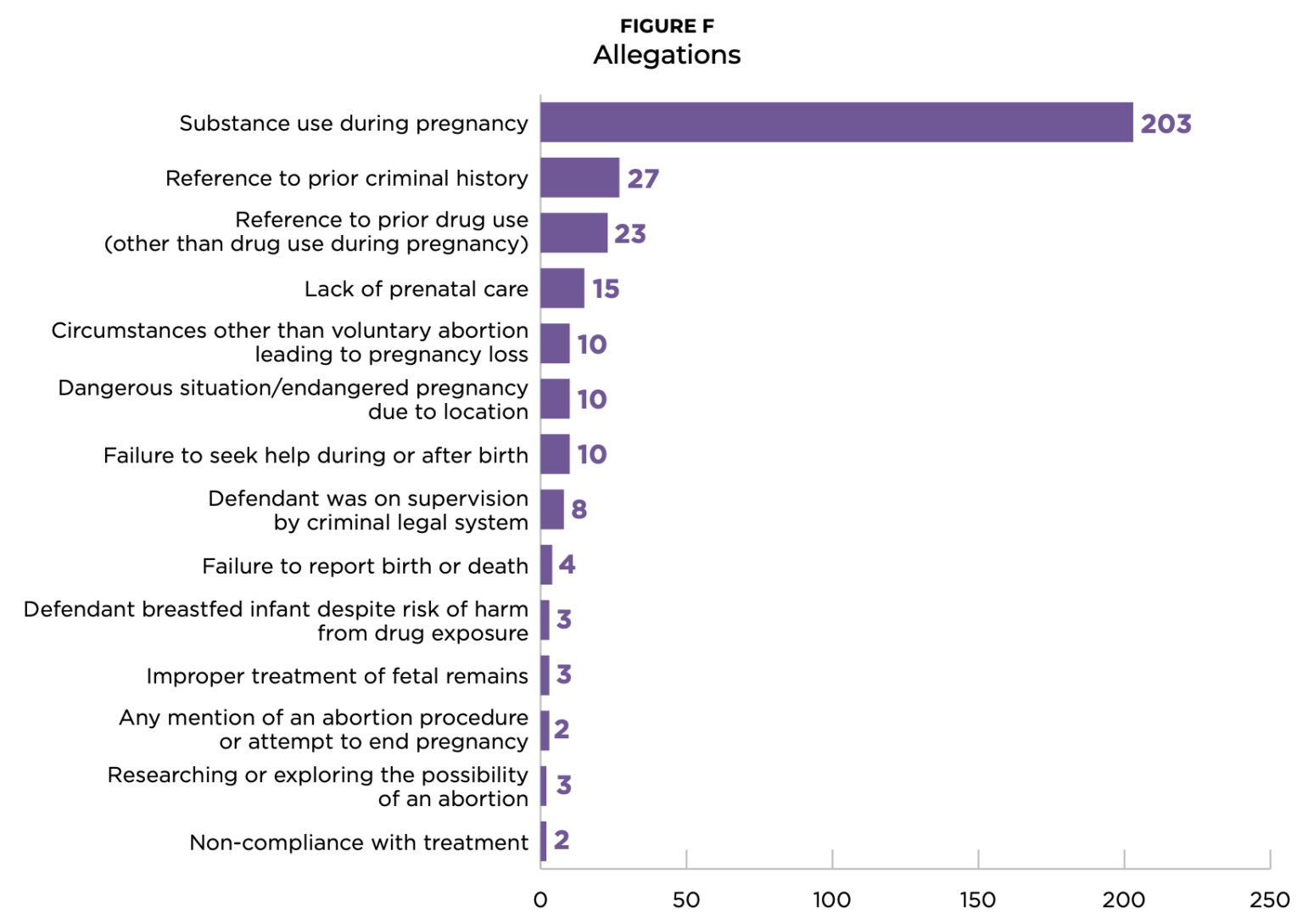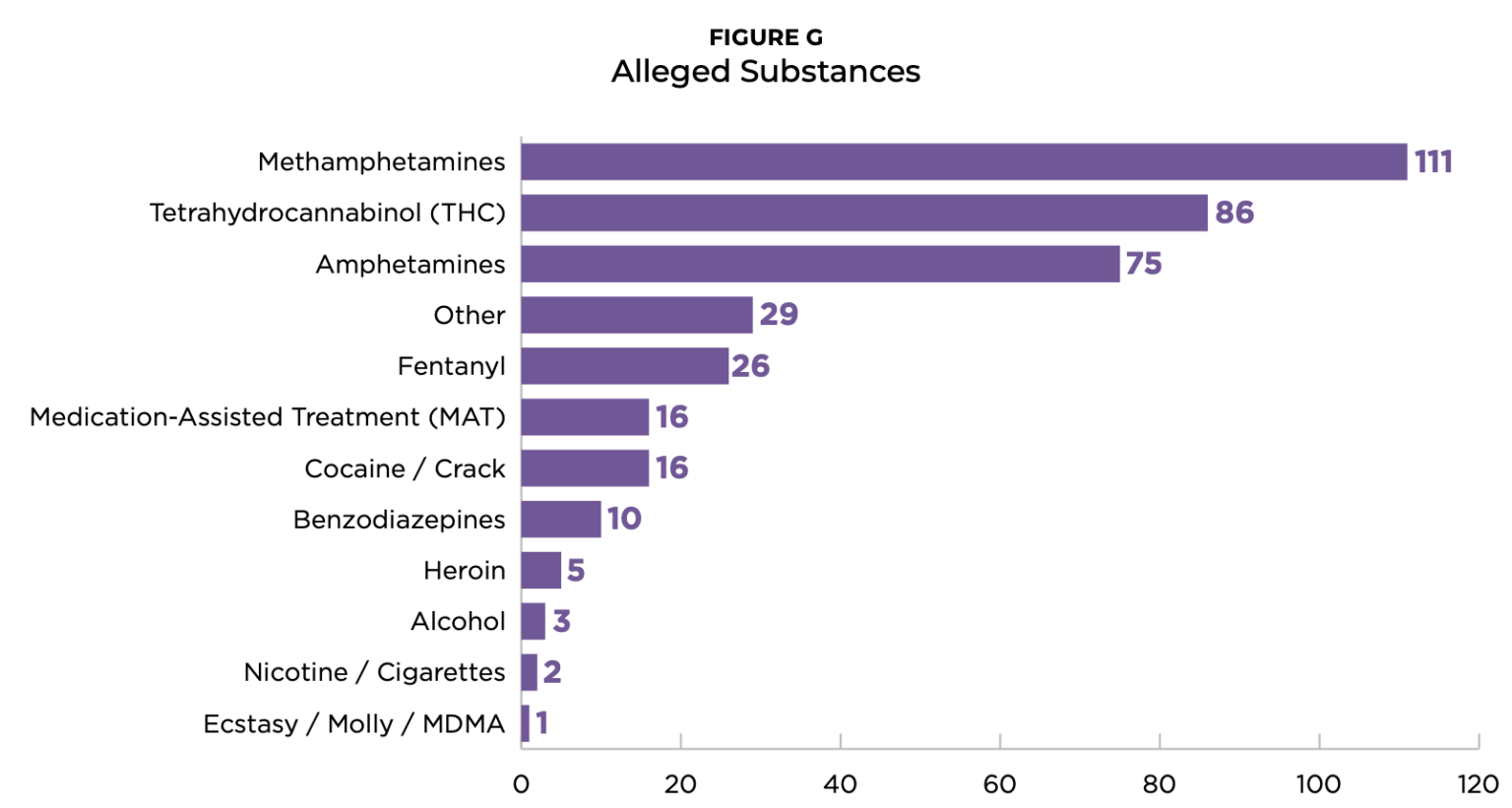A new report from a reproductive rights organization finds that pregnancy-related prosecutions are at an all-time high in the wake of the 2022 Supreme Court decision that ended the nationwide right to abortion. And by far the most common criminal allegation facing pregnant people is that they used marijuana or other drugs during their pregnancies.
Some women are even being prosecuted for medical cannabis use as registered patients under state law.
The report, from the group Pregnancy Justice, identified 210 criminal cases filed against people for conduct associated with pregnancy, pregnancy loss or birth during the first year after the Dobbs ruling, which overturned Roe v. Wade. Of those, 203 cases—nearly 97 percent—involved allegations of substance use during pregnancy. Drug use was the sole allegation in 133 of those cases.
“In five of those cases, the defendant had a medical marijuana card, indicating she was being charged with taking legally prescribed medication.”
Marijuana was the second most commonly cited drug in the court charges, following methamphetamine, with allegations of cannabis use appearing in 86 of the 210 cases. In more than a third of those cases, THC use was the only allegation underlying the criminal charges.
“It is significant that, in 86 cases, the police or prosecution alleged that the defendant took some form of THC during her pregnancy, and in 31 of those 86 cases, the only allegation supporting prosecution was THC use,” the new report says. “Even more startling, in five of those cases, the court file included statements that the defendant had a medical marijuana card, indicating that she was being charged with taking legally prescribed medication.”

Image via Pregnancy Justice
Moreover, Pregnancy Justice said in a press release about the report, in the “vast majority of cases (191), the charges brought against the pregnant person did not require any ‘proof’ of harm to the fetus or baby, but merely a perceived risk of harm.”
The report, “Pregnancy as a Crime: A Preliminary Report on the First Year After Dobbs,” looks at cases from June 24, 2022 to June 23, 2023. Authors say the research “is ongoing and will result in additional reports in the coming years.”
While the number of pregnancy-related prosecutions has risen since the Dobbs ruling, the report emphasizes that targeting pregnant people with drug-related charges has a history stretching back years.

Image via Pregnancy Justice
“As has been the case for decades, nearly all the cases alleged the pregnant person used a substance during pregnancy,” the report says. “As drug use patterns have changed, pregnancy prosecutions have shifted from targeting the use of crack cocaine to focusing on the use of methamphetamines, amphetamines, marijuana and opiates.”
Authors said the project sought to explore how criminal laws would be used to prosecute pregnant people in the wake of Dobbs.
“We learned that prosecutions in the year after Dobbs represent a high-water mark in pregnancy criminalization.”
“Following the Dobbs decision, we set out to answer the question, how would criminal laws be used to prosecute acts associated with pregnancy,” Wendy Bach, principal investigator of the report and professor at the University of Tennessee law school, said in the press release.
“We learned that prosecutions in the year after Dobbs represent a high-water mark in pregnancy criminalization, following from increased suspicion and surveillance of pregnant people,” she said. “With this report, we hope to see both more attention on pregnancy-related prosecutions and more advocacy to reverse course on the criminalization of pregnant people.”
Notably, rates of prosecution varied strikingly across the country, according to the report. Alabama, for example, was responsible for nearly half of the prosecutions, at 104, followed by Oklahoma at 68 and South Carolina at 10.
The majority of defendants charged in pregnancy-related cases were also on low incomes, the report notes.
In Oklahoma, local news in 2022 began reporting that prosecutors there were targeting pregnant women for using medical marijuana, resulting in felony child neglect charges being filed against 26 mothers. The crime can carry up to life in prison in Oklahoma.
Then in July, a state court ruled that people cannot be prosecuted for child neglect for legally using medical marijuana while pregnant.
In 2022 an Alabama Senate committee approved a bill to force women who want medical marijuana to provide a negative pregnancy test.
Photograph by HAH Photography via Flickr/Creative Commons 2.0
This story was originally published by Marijuana Moment, which tracks the politics and policy of cannabis and drugs. Follow Marijuana Moment on Twitter and Facebook, and sign up for its newsletter.





Show Comments